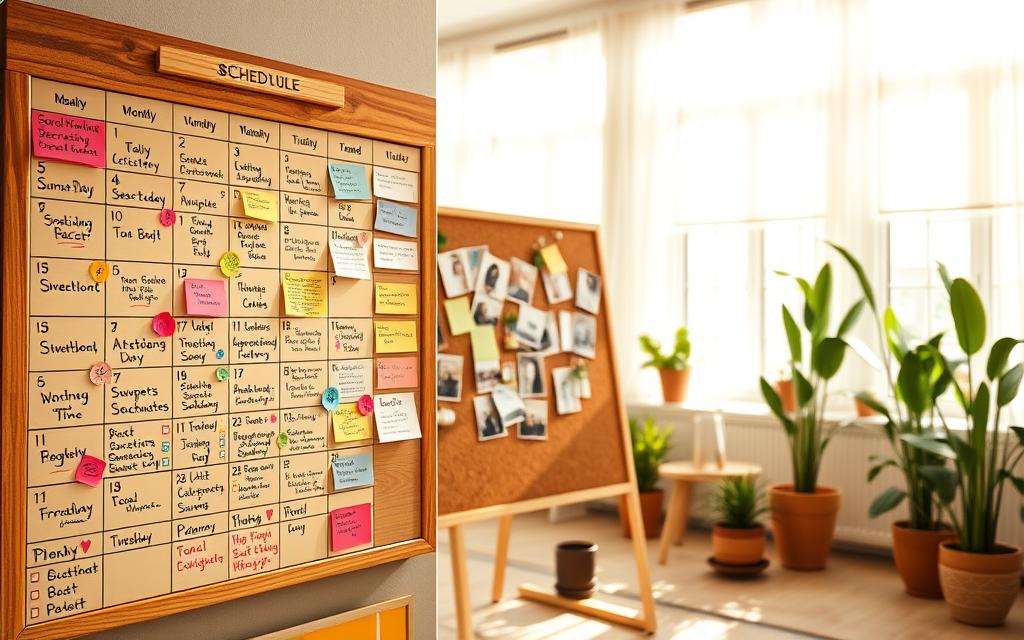As a parent, managing kids during summer break can be a daunting task. Keeping them entertained, happy, and engaged is crucial for a stress-free summer.
Creating a balanced summer break schedule for kids is essential. It helps in planning parenting tips for summer break and making the most of the season. With the right strategies, you can turn summer break into a memorable experience for your family.
From planning fun activities to managing daily routines, this guide provides expert advice on keeping kids entertained in summer. By following these practical tips, you can ensure a fun and relaxing summer break for your kids.
Preparing for the Summer Break Challenge
Preparing for summer break is essential to ensure a fun and stress-free experience for your family. To achieve this, you need to assess your family’s needs and expectations, set realistic goals, and create a summer break command center.
Assessing Your Family’s Needs and Expectations
Start by understanding what your family needs from the summer break. Consider your children’s ages, interests, and energy levels. Identify any specific requirements, such as childcare or activities for kids with special needs. This assessment will help you plan a tailored approach to meet everyone’s needs.
Setting Realistic Goals for the Summer
Setting achievable goals is crucial for a successful summer break. Determine what you want to accomplish, whether it’s completing a project, improving family bonding, or simply having a relaxing break. Be realistic about what you can achieve in the given timeframe.

Creating a Summer Break Command Center
A summer break command center is a centralized hub where you can organize schedules, activities, and important documents. This can be a physical space or a digital tool. Having everything in one place will help you stay organized and reduce stress.
Creating a Balanced Summer Schedule
Creating a balanced summer schedule can be a game-changer for families looking to make the most of their summer break. A well-planned schedule helps ensure that kids stay engaged, entertained, and active during the summer months.
Structuring Days Without Overscheduling
When structuring your summer days, it’s essential to strike a balance between planned activities and free time. Avoid overscheduling, as it can lead to burnout and make the summer feel more like a chore than a break. Instead, plan a mix of activities that cater to your child’s interests and allow for spontaneity.
Incorporating Flexibility into Your Routine
Flexibility is key to a successful summer schedule. Be prepared to adjust your plans according to the weather, your child’s mood, or unexpected events. Incorporating flexibility into your routine helps reduce stress and makes the summer more enjoyable for everyone.

Sample Summer Break Schedules for Different Age Groups
Different age groups have different needs when it comes to summer scheduling. For younger kids, a simple routine that includes playtime, reading, and outdoor activities can be beneficial. For older kids, incorporating more structured activities like camps, sports, or educational programs can be more engaging. Here are some sample schedules to consider:
For preschoolers: Morning playtime, lunch, nap, outdoor activities, dinner, evening storytime.
For school-age kids: Morning camps or activities, lunch, free time, outdoor games, dinner, family movie night.
By tailoring your summer schedule to your child’s age and interests, you can create a balanced and enjoyable summer break.
The Ultimate Summer Break Survival Guide for Parents
As a parent, you’re about to embark on a challenging yet exciting journey – surviving the summer break with your sanity intact. To make it through, you’ll need more than just a few tricks up your sleeve; you’ll need a comprehensive plan that includes the right supplies, a supportive community, and strategies to maintain your own well-being.
Essential Supplies and Resources
Stocking up on the right supplies can make a significant difference in your summer break experience. Essential items might include a variety of arts and crafts materials, outdoor games, and a well-stocked first-aid kit. Consider creating a summer break survival kit that includes your favorite snacks, a portable charger, and other must-haves.
Building Your Parent Support Network
No parent is an island. Building a parent support network can provide you with the camaraderie, advice, and occasional babysitting swap that can be a lifesaver during the summer months. Join local parenting groups, attend community events, or connect with other parents at your child’s sports practices or recitals.
Self-Care Strategies for Maintaining Sanity
Amidst the chaos of summer break, don’t forget to prioritize your own self-care. Simple acts like taking a relaxing bath, reading a book, or enjoying a quiet cup of coffee can recharge your batteries. Consider scheduling regular me-time into your calendar to maintain your sanity and keep your cool.
By being prepared with the right supplies, surrounded by a supportive community, and prioritizing your own well-being, you’ll be well-equipped to navigate the challenges of summer break. This summer break survival guide is your roadmap to a stress-free and enjoyable summer.
Keeping Kids Engaged: Indoor Activities
When the rain pours down, keeping kids engaged indoors can be a challenge, but with the right activities, it can also be a great opportunity for fun and learning. Indoor activities offer a chance to explore new hobbies, learn new skills, and enjoy quality time together as a family.
Rainy Day Activity Ideas
On rainy days, consider indoor treasure hunts, cooking or baking together, or setting up an indoor camping adventure with tents or a “fort” made out of blankets. You can also have a dance party or create a homemade obstacle course to keep kids active and entertained.
Creative Arts and Crafts Projects
Arts and crafts projects are perfect for fostering creativity. Set up a craft station with materials like paper, glue, scissors, and paint, and let your kids’ imagination run wild. You can make handmade cards, DIY jewelry, or create a collage using recycled materials.
Preventing the “Summer Slide” with Fun Learning
To prevent the “summer slide,” incorporate educational activities into your indoor routine. Engage your kids in summer reading challenges, math games, or science experiments that are both fun and informative. Online resources and educational apps can provide a wealth of ideas and materials to support learning.
Outdoor Adventures for Family Fun
As the summer sun shines bright, it’s the perfect time to take your family’s outdoor adventures to the next level. Outdoor activities are an excellent way to keep your kids active, engaged, and enjoying the summer weather. By incorporating these adventures into your summer break, you can create lasting memories with your family.
Backyard Activities That Keep Kids Moving
Transform your backyard into a fun zone with activities like water balloon fights, backyard obstacle courses, and scavenger hunts. These activities are not only entertaining but also promote physical activity and teamwork among kids.
Exploring Local Parks and Nature Areas
Take advantage of nearby local parks and nature areas by planning hikes, picnics, or simply exploring the surroundings. These outings can be both educational and exciting for kids, fostering a love for nature and the outdoors.
Water Activities for Hot Summer Days
Beat the heat with water activities such as visiting a nearby pool, playing with water guns, or even setting up a DIY sprinkler system in your backyard. These activities are sure to bring joy and relief during the hot summer days.
Managing Behavior Challenges and Sibling Dynamics
Navigating the complexities of behavior challenges and sibling dynamics is crucial for a harmonious summer break. As kids spend more time at home, the potential for conflicts increases, making it essential for parents to implement effective strategies.
Strategies for Reducing Conflicts
One effective way to reduce conflicts is by establishing a clear set of rules and consequences. This helps create a sense of structure and fairness, minimizing disputes among siblings. Encouraging teamwork through activities like cooking or gardening can also foster cooperation and reduce rivalry.
Creating Opportunities for Independence
Allowing children to have independence can significantly reduce conflicts. By giving them responsibilities or allowing them to choose their activities, you encourage self-reliance and reduce competition for your attention.
When and How to Intervene Effectively
Knowing when and how to intervene is crucial. Parents should step in when conflicts escalate or when safety is a concern. Intervening effectively involves staying calm, listening to both sides, and guiding children towards resolving their differences.
By understanding the root causes of conflicts and implementing these strategies, parents can create a more peaceful home environment during the summer break. This not only reduces stress but also makes the summer more enjoyable for everyone.
Planning Memorable Family Trips and Staycations
Summer break is the perfect time to create lasting memories with your family through well-planned trips or staycations. Whether you’re looking for a quick weekend getaway or a longer vacation, there are numerous ways to make your summer break exciting and memorable.
Budget-Friendly Vacation Ideas
Planning a budget-friendly vacation doesn’t mean you have to compromise on fun. Consider camping trips, visiting local museums or historical sites, or exploring nearby cities. These options are not only affordable but also provide a rich experience for your family.
Turning Your Home into a Staycation Destination
You don’t need to travel far to have a great vacation. Turning your home into a staycation destination can be just as exciting. Create a backyard camp, have a movie marathon, or plan a themed dinner night. The possibilities are endless, and it’s a great way to bond with your family without the hassle of traveling.
Day Trips That Feel Like Getaways
Day trips can be a great way to explore new places without the need for an overnight stay. Look for nearby attractions like national parks, beaches, or amusement parks. With a little planning, you can turn a simple day trip into a memorable adventure.
Conclusion: Embracing the Summer Journey
As you embark on your summer journey, remember that it’s a time for growth, learning, and making memories with your family. By embracing the strategies and tips outlined in this summer break survival guide, you can navigate the challenges of summer with confidence. Effective parenting tips, such as creating a balanced summer schedule and planning memorable family trips, will help you make the most of your summer.
Embracing summer means being open to new experiences and flexibility in your plans. With the right approach, you can turn potential chaos into a fun, stress-free, and enjoyable summer break for your loved ones. By applying the insights from this guide, you’re well on your way to creating a memorable summer journey for your family.







